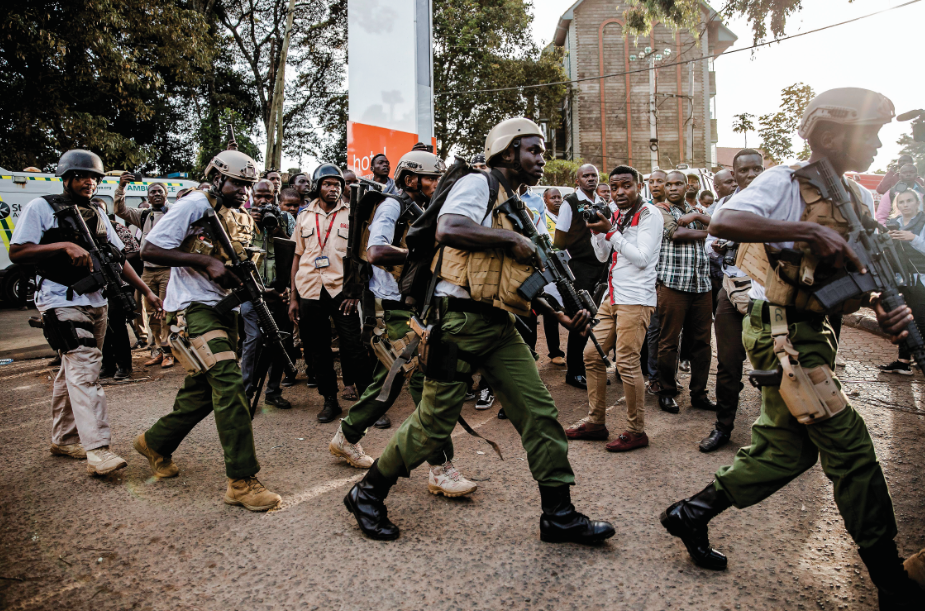On a quiet afternoon in the new year, gunshots and explosions rocked a hotel in the heart of Nairobi. The terror was another deafening blow to the city’s business community.
The gunshots and explosions rang out first. As scores of people fled the 14 Riverside complex in panic, others remained trapped within its office blocks and inner buildings. At the DusitD2 hotel parking lot in Nairobi, Kenya, vehicles burned violently. In the foyer, guests lay wounded, only just surviving the horror of a suicide bombing. Outside, more gunshots as the chaos intensified.
“We are under attack!” an unidentified employee within the hotel building told Reuters in the early moments.
“We are still in [the] bathroom […] gunshots in building, please pray for us,” Ronald Ng’eno, a terrified civilian, tweeted from his hiding place shortly after telling his family goodbye.
As the siege ended the next morning, confirmed by Presidential address, the city began to take stock. Phone calls were exchanged between friends and family. Companies within the complex set up hotlines for those searching for their loved ones. At the nearby Chiromo mortuary, a tracing desk was kept busy for those who needed more concrete answers.
This was not the first attack of its kind in Nairobi. In 2013, terrorists opened fire on unassuming shoppers at the Westgate Mall resulting in an 80-hour assault that claimed the lives of 67 people. Over a decade earlier, the American embassy in the capital was bombed in an explosion that killed 213 civilians and wounded at least 4,000 others.
The latest incident, however, was perhaps the most terrifying coming after a period of relative calm in the country. The hotel, a popular venue for business meetings, was situated in the heart of the Riverside complex that also housed the regional headquarters of major local and international firms.
The devastation, much like those of Westgate, will be felt not only in human cost but in the economic losses that the country will likely face. This, experts say, may have been the intention of Al-Shabaab, the Al-Qaeda-backed Somali terror group that took credit for the insurgency.
Among Al-Shabaab’s economic victims are the small business owners of the complex who, among their neighbors, will feel the biting losses the most.
Sam Omindo, founder of Genteel, a men’s tailoring brand that was due to launch at the complex late January, was worried about starting again.
“My plans have to change and the arrangements that went into preparing for the launch are technically null and void,” he says.
Genteel was a tenant of Metta, an entrepreneur’s club located in the Belgravia building only a few feet behind the hotel. Originally from Hong Kong, Nairobi was the club’s second site and an epicenter for creative businesses in the city. It was also where Omindo met clients and partners on a regular basis.
“I’m not too sure if people would still be comfortable coming there…[this] means I’d have to look for an alternative somewhere else,” he ruminates.
Beyond this, the fashion entrepreneur also finds himself counting the cost of the attack on his fledgling business.
He estimates that regrouping his enterprise would set him back a few thousand dollars, money that he hoped to launch his business with.
Businesses like Omindo’s will continue to suffer in the insecurity that follows the January attacks. Past incidents of terrorism were found to decrease the country’s foreign direct investment significantly. In 2013, after Westgate, this was a 14% decline and investor confidence plummeted due to fears around the security situation worsening.
Notwithstanding, the cost of doing business in Nairobi will also rise. Insurance premiums after the mall shootings went up by about 40% which translated to about 3% of annual revenues. At the time of going to print, estimates on the costs of terrorism and political violence cover for local businesses were yet to be established but were expected to follow a similar trend.
What is known, however, is that for the coming months, businesses at 14 Riverside will be slow to recover. At the time of publishing, all of the over 40 businesses had closed their doors indeterminately with their offices cordoned off as investigations continued.
